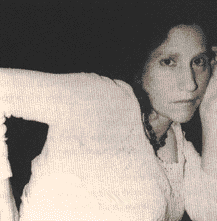Marieke Bivar
Diane di Prima (1934–2020)
Beat Poet & Activist
Diane di Prima has died. Now we have no choice but to introduce her to each other, since she is no longer here to introduce herself.

On paper, you could say, “she was a poet, she was a feminist, beatnik, anarchist, Buddhist.” You could list her famous friends and lovers. Promote her books, her poems, her art. But she was so many things.
Beat goddess-child, mother, full of wonder, woman’s insight, wolf-woman, shelterer of fellow queers, full of joy, love-seeker, runaway, homemaker, follower of the muses and artist-muse.
She sang her life to us in poems, in the creative fiction Memoirs of a Beatnik, in the infinitely layered memoir-treasure Recollections of My Life as a Woman. She was sacred, profane, careless, caring, loved. She and her cycle of artists and other bringers of life lived in an in-between, creating their own world, messing up, showing it. She prayed differently than her Catholic grandmother and saw further into the dark than her atheist grandfather. She held her anarchist ancestors, blood or otherwise, close, clinging fiercely to independence, believing in the possibility of new worlds in our hearts. She offered us her pain and her joy, her wisdom, and her hunger for knowledge.
She was a romantic cynic, patient crone before her time. In place of the things, she refused (nine-to-five, respectability, heteronorms, nothingness) she planted something richer, more generative. She strove for a life that was an offering, willingly sacrificed to art, in exchange for a place among other misfits, faces turned towards the sun, awaiting instruction, inspiration, something. She saw her children come into being, her lovers and friends come and go, and her writing travel through different forms, from playful Beat experiments like the poem “No Problem Party Poem” to the dense spiritual introspection of Loba. What she did with her life was not heroic or singular, but she did leave a map, a record of her wanderings that, although not promising to lead us anywhere or take us to the same places she inhabited, is a magical legacy, and a gift.
Trying to memorialize her is a painful exercise in mourning, a slog through the knowledge that there is no way to sum up her contributions, convey her worth, the pain of her loss. But she left so much of herself behind that there is no need.
You can meet her in her work, know her deeply or fleetingly. Read her books about wild Beats and dream back to that world of discovery and adventure, reject the stilted lives of their parents with them. And create monuments, of which this is one, not just to Diane, but to the wide-open arms of struggle against the status quo, to our family of Beats and Black revolutionaries and queer freedom fighters and anarchists. That is what Diane di Prima did. She wrote a love letter for us, Revolutionary Letters to us, created monuments of stanzas to help us remember our past, our present, our shared purpose.
Whether she was gently lambasting a poet in residence, recounting a wild party, remembering her life growing up in Brooklyn in the 1940s, or regaling us with tales of dropping acid with the man-Beats, Diane knew best how to tell her life story. This is not a biography or an obituary.
This is a love-letter monument to a sister I only met through books.
Now, you are introduced. May you love her as much as she loved you.
Marieke Bivar is in Montreal, avoiding the plague like, well, the plague. She has been writing, translating and hatching get rich quick schemes that exclude having or being a boss while shouting “free them all” at the prison guards, and “Black lives matter” into the white void.
Revolutionary Letter #29
by Diane di Prima
beware of those
who say we are the beautiful losers
who stand in their long hair and wait to be punished
who weep on beaches for our isolation
we are not alone: we have brothers in all the hills
we have sisters in the jungles and in the ozarks
we even have brothers on the frozen tundra
they sit by their fires, they sing, they gather arms
they multiply: they will reclaim the earth
nowhere we can go but they are waiting for us
no exile where we will not hear welcome home
‘good morning brother, let me work with you
good morning sister, let me
fight by your side’
